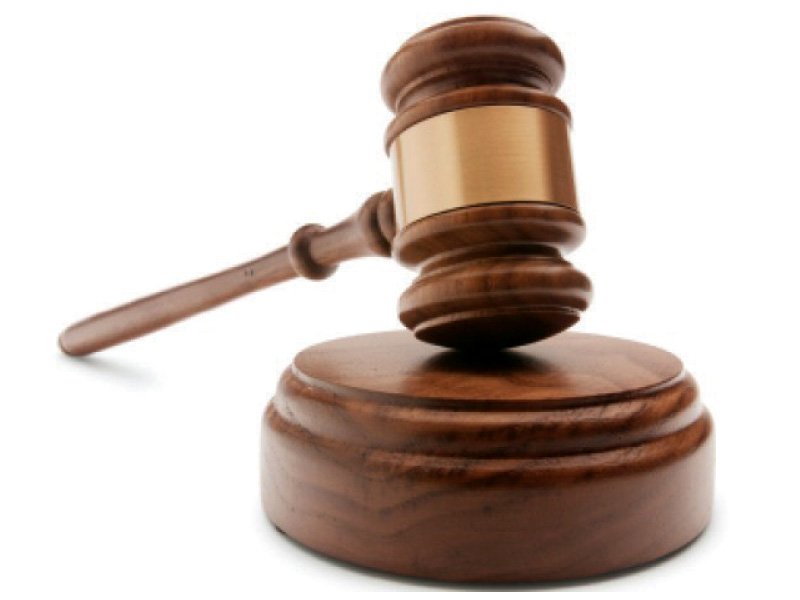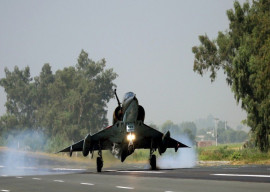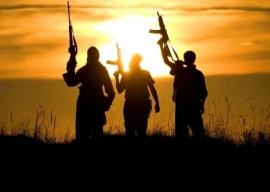
Both houses of parliament approved the 21st Amendment Bill 2015 and the Pakistan Army Act Amendment Bill 2015 on Tuesday.
However, members of the civil society questioned the structure of the special courts and if they were the most effective way to try terrorism cases.
Under the amendment, the military courts, with the permission of federal courts, will be allowed to try any person claiming or known to have links with any terrorist group or organisation affiliated with religion or sect. Moreover, the federal government can also transfer pending cases to military courts.
Civil society activists are of the view that existing structures of investigation and prosecution should be strengthened and scientific methods of investigation should be adopted rather than outdated inhuman methods of torture and coercion.
They also suggest that better security and protection to witnesses, lawyers, and judges should be provided. The decision is all the more questionable as the Supreme Court itself is attempting to expedite cases of terrorism.
“Today is yet another sad day in Pakistan’s checkered constitutional history” said Tahira Abdullah, peace and human rights activist.
Speaking to The Express Tribune, Adullah said, “The 21st Constitutional Amendment is not a good omen for the future of democracy for which we have struggled and suffered so long and so hard”.
She said that the decision augurs ill for the dignity, independence and supremacy of the judiciary.
“We are informed that no appeal to high courts or to the Supreme Court will be possible after being sentenced by the military courts,” she expressed her apprehension.
“Not only do we have to confront terrorism but we will be confronted with a parliament that has weakened the rule of law,” Hina Jilani, an advocate of the Supreme Court and a human rights defender said.
“We do not have the capacity of good governance to confront such issues which could lead to loss of security, livelihood and prosperity,” said Jilani.
She further said that military courts were not necessary and were irrelevant in the fight against terrorism.
Human rights activist and Awami Workers Party vice-President Dr Farzana Bari criticised the government saying instead of removing the flaws in the existing structures it was handing over judicial powers to an institution that is not concerned with it. “Military courts are not solutions to terrorism,” she observed. Human Rights Commission of Pakistan also opposed the decision, stating that it was dismayed that all political parties supported this unfortunate decision.
In a statement last week the commission said the decision undermined the judiciary and showed lack of confidence in an independent and strong judicial system in the country. It must be noted that the superior judiciary has, several times in the past, ruled that military courts are unconstitutional.
The commission argues that trying civilians in military courts has always been a controversial issue and also opposed by the superior judiciary. The system of ‘speedy justice’ has never proved to be fair.
It also expressed the fear that political dissidents, particularly in Balochistan and Sindh, could become targets of military courts.
Published in The Express Tribune, January 7th, 2014.
COMMENTS (2)
Comments are moderated and generally will be posted if they are on-topic and not abusive.
For more information, please see our Comments FAQ


1732243059-0/mac-miller-(2)1732243059-0-165x106.webp)

1672385156-0/Andrew-Tate-(1)1672385156-0-165x106.webp)












While I have no doubt that Maha Mussadaq's concern over the establishment of military courts is sound in theory, but in order to be able to cope with the desperate situation that we are facing, it also has to be practical in operation, and that is where I see a problem.
The civil society activists have asked the government to reform and strengthen the investigation and prosecution systems. These is also a need to provide protection to judges, lawyers and the witnesses. And the list of pending case with various courts run into thousands, emphasizing the need for far more judges then there are at present. There is also a need for increasing the strength of the police force and to improve their effectiveness through training and availability of advanced technology and necessary equipment. The necessary measures can be introduced by the govenment through Acts of Parliament or through administrative measure and would require financial resources and more than that, a will to see it done. However, our governments which have been hacking down the independence of various institutions and have been placing their favourites as heads in order to facilitate their corruption, are hardly likely to see an independent police force emerging. And because of the power that it exercises, the police department is especially vulnerable to government manipulations. So, in the situation where the governments place favourite police officers in important positions, and even the cases of important, high-revenue-earning police stations being put to auction, how can there be any meaningful police reforms?
One objection against military courts is that their timing is most unfortunate, coming when the Supreme Court is attempting to expedite cases of terrorism. However, it must be noted that at the most, the Supreme Court can improve matters which come under its control but can do little with regard to improving investigation and prosecution and to institute other necessary measures, which can be done only by the government in power. And that leads us to the inevitable conclusion that to be able to have a reformed investigation and prosecution system, we have to reform our rulers first, and that is by no means easy.
So, all considered, military courts provide the only short-to-medium term practical solution for our pressing problem which needs urgent handling.
Admitted, the introduction of military courts could curb rights of prisoners to some extent and they may end up receiving punishments harder than would have been given by civilian courts which could even have acquitted them because of faulty investigation and prosecution. To people terribly upset over this factor, I will suggest thinking of the innocent victims as well. The situation of a criminal getting a bit harsher treatment is infinitely preferable to the one where totally innocent men, women and children get killed or maimed for no fault of theirs.
Perhaps it would help to realize that it is not strictly a matter of choosing between right and wrong but between lesser wrong or greater wrong, and given that choice, it should not be difficult to determine which one to opt for. At the same time, we must strive for the real solution, which is to reform the whole system related to dispensation of justice, and going back a step, reform or change those who have utterly failed to perform the duties that the people elected them for.
Karachi
If by civil society you mean Asma jahangir and Hamid Mir then I am sorry to say that these two belong to the most uncivilized society. Asma jahangir is very fond of drinking blood of our children and hamid Mir is cannibal.